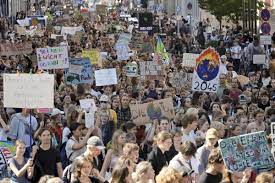
Tens of thousands of climate activists around the world launched protests Friday to call for an end to the burning of planet-warming fossil fuels as the globe suffers dramatic weather extremes and record-breaking heat, with plans to continue through the weekend.
The protests — driven by several mostly youth-led, local and global climate groups and organizations, including Greta Thunberg’s Fridays for Future movement — were taking place in dozens of countries and hundreds of cities worldwide.
In Quezon City in the Philippines, activists lay in front of the Department of Environment and Natural Resources in protest, and held signs demanding fossil fuels — from coal to natural gas — be phased out. Outside the Ministry of Energy and Mineral Resources office in Jakarta, Indonesia, protesters held signs calling for end to dirty fuels and greenwashing as police officers looked on.
In Sweden, climate activists gathered in front of Parliament, just next to the Royal Palace where Sweden’s King Carl XVI Gustaf was celebrating his 50th anniversary on the throne. Their chants about “climate justice” could be heard in the palace courtyard as the king watched the changing of the guard during the golden jubilee celebrations.
And in Democratic Republic of the Congo, dozens joined a protest march through the city of Goma, shouting slogans and waving banners and placards calling for an end to corporate control of fossil fuels. The Congolese government caused an uproar among environmentalists last year by putting 30 oil and gas blocks up for auction, including 13 blocks crisscrossing through protected areas and national parks.
A week before the planned protest, the United Nations warned that countries are way off track to curb warming to 1.5 degrees Celsius (2.7 degrees Fahrenheit) since pre-industrial times, as agreed in Paris in 2015. The world has warmed at least 1.1 degrees (2 degrees Fahrenheit) since then.
Over the past few months, Earth broke its daily average heat record several times according to one metric, July was the hottest month ever on record, and the Northern Hemisphere summer was declared the hottest on record.
Dozens of extreme weather events — from Hurricane Idalia in the southeastern United States to torrential flooding in Delhi in India — are believed to have been made worse by human-caused climate change.
Another major strike is planned to take place Sunday in New York, to coincide with the city’s Climate Week and the U.N. climate summit.
Climate activists have organized similar worldwide strikes in recent years, where protesters from different nations join together on a single day.
___
Associated Press climate and environmental coverage receives support from several private foundations. See more about AP’s climate initiative here. The AP is solely responsible for all content.







